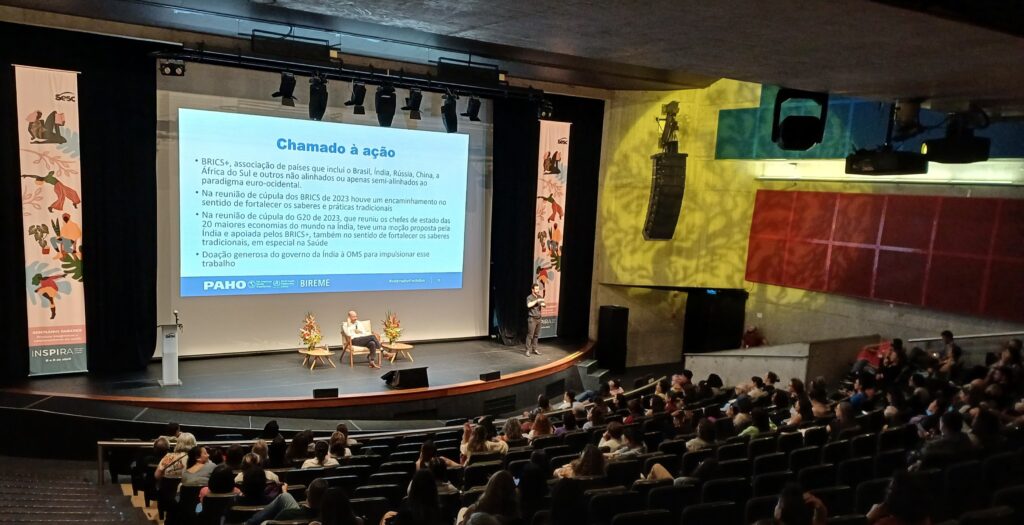How can science, ancestral knowledge and digital transformation be combined for the benefit of public health? This was the proposal put forward by João Paulo Souza, director of BIREME/PAHO/WHO, during the ‘Knowledge for Care’ seminar, held on April 8 and 9 in São Paulo, as part of the SESC Inspira program, which celebrates World Health Day with educational and cultural activities at its units.
Organized by São Paulo’s Social Service of Commerce (SESC) – a Brazilian institution dedicated to promoting health, culture, education and social well-being – the event brought together more than 200 participants, including health professionals, local policymakers, staff from various SESC units and the general public. The seminar was also attended by renowned academics, health professionals and traditional healers, reflecting an intercultural approach to care and knowledge.
In his speech, João Paulo Souza shared the progress in the collaborative construction of the WHO Traditional Medicine Global Library (TMGL), an initiative led by BIREME and the WHO Global Center for Traditional Medicine (WHO GTMC), in conjunction with other institutions and collaborative networks.
Souza emphasized that digital transformation has the potential to be a great ally of traditional knowledge: “Digital transformation can be an ally of ancestry when it is used to preserve, connect and protect the knowledge of peoples. From this perspective, it is possible to develop multisystem databases to identify safe, effective and culturally appropriate practices inspired by traditional wisdom.”
TMGL was presented as a collaborative and decentralized digital infrastructure designed to integrate traditional knowledge, practices and care systems from different regions of the world, in dialogue with a contemporary scientific approach. Conceived from a multisystem perspective, the library seeks to articulate ancestral knowledge with modern science and digital technologies, promoting intercultural respect, health equity and sustainability. According to Souza, this approach opens up the possibility of enriching public health policies and practices by integrating different medical rationalities under the criteria of safety, efficacy and cultural relevance.
Souza explained that TMGL will include a global portal, six regional portals and national and thematic collections, such as Ayurveda, indigenous medicines, African ancestral medicine and Afro-diasporic medicine, among others. Its functionalities include access to scientific databases, evidence maps, digital preservation of traditional knowledge, protection of the collective intellectual property of indigenous peoples and local communities (PICL). All this with the aim of strengthening informed and culturally appropriate decision-making in public policies and health systems.
During his presentation, BIREME’s director also highlighted the challenge of promoting a respectful and productive epistemic dialogue between the different knowledge systems: “The challenge is how to guarantee universal, inclusive and respectful access to these practices, recognizing their community, ancestral and spiritual value, while identifying those that are safe, effective and culturally appropriate to strengthen health systems from a pluralistic perspective,” he said.
The presentation concluded with a call for collaboration, emphasizing that TMGL is a public good built collectively, whose development depends on the joint commitment of networks, communities, institutions and decision-makers: “Nothing is built alone. TMGL will be a public good, the result of collaboration between networks, communities and institutions.”

🔗 Further information (in Portuguese): https://www.sescsp.org.br/editorial/saberes-do-cuidado/